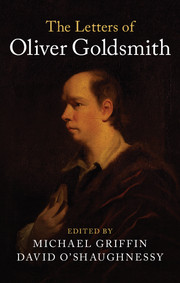47 - To George Colman, [London, January 1773]
Published online by Cambridge University Press: 12 December 2024
Summary
In this letter Goldsmith betrays his anxieties about the fate of the comedy that would eventually be titled She Stoops to Conquer, a complete draft of which he had completed by September 1771 (see Letter 37). Evidently, Goldsmith was under some financial pressures at this time but the precise nature of his troubles is not known.
Prior states that Goldsmith was actively trying to secure the play's representation from the start of the 1772–3 season (i.e. September 1772), hence the somewhat frantic tone. Colman, manager of the Covent Garden Theatre, had many objections to the piece, even writing them out on the manuscript for Goldsmith’s consideration (possibly by way of response to this letter) although Goldsmith apparently ignored them (CW, V: 87). The precise nature of these objections is not known although Colman may have read the scenes with Tony Lumpkin in The Three Jolly Pigeons and remembered uneasily the audience reaction to the similarly ‘low’ bailiff scene in The Good Natur’d Man. In any case, Colman would regret his disapproval as it made him an object of public ridicule in the press after the success of the piece. One ditty began:
Come, Coley, doff those mourning weeds,
Nor thus with jokes be flamm’d;
Tho’ Goldsmith's present play succeeds,
His next may still be damn’d.
Colman was eventually compelled to write to Goldsmith and ask him to intercede with the vituperative press on his behalf.
The copy-text is taken from Posthumous Letters, from Various Celebrated Men: Addressed to Francis Colman, and George Colman, the elder…. (1820), where the letter was first published. The location of the original manuscript is unknown.
Dear Sir
I entreat you’l relieve me from that state of suspense in which I have been kept for a long time. Whatever objections you have made or shall make to my play I will endeavour to remove and not argue about them. To bring in any new judges either of its merit or faults I can never submit to. Upon a former occasion when my other play was before Mr. Garrick he offered to bring me before Mr. Whitehead's tribunal but I refused the proposal with indignation: I hope I shall not experience as hard treatment from you as from him.
- Type
- Chapter
- Information
- The Letters of Oliver Goldsmith , pp. 111 - 112Publisher: Cambridge University PressPrint publication year: 2018

